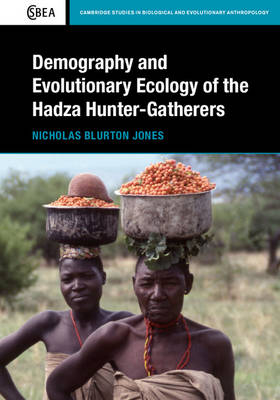
Demography and Evolutionary Ecology of Hadza Hunter-Gatherers
Cambridge University Press (Verlag)
978-1-107-06982-4 (ISBN)
The Hadza, an ethnic group indigenous to northern Tanzania, are one of the few remaining hunter-gatherer populations. Archaeology shows 130,000 years of hunting and gathering in their land but Hadza are rapidly losing areas vital to their way of life. This book offers a unique opportunity to capture a disappearing lifestyle. Blurton Jones interweaves data from ecology, demography and evolutionary ecology to present a comprehensive analysis of the Hadza foragers. Discussion centres on expansion of the adaptationist perspective beyond topics customarily studied in human behavioural ecology, to interpret a wider range of anthropological concepts. Analysing behavioural aspects, with a specific focus on relationships and their wider impact on the population, this book reports the demographic consequences of different patterns of marriage and the availability of helpers such as husbands, children, and grandmothers. Essential for researchers and graduate students alike, this book will challenge preconceptions of human sociobiology.
Nicholas Blurton Jones is Professor Emeritus of Anthropology at the University of California, Los Angeles. His research has focussed on applying the methods of animal behaviour research in direct studies of human behaviour across varied settings including hunter-gatherer cultures. He has conducted fieldwork in Alaska and Botswana and between 1982 and 2000 made a series of field visits to the Hadza in Tanzania. He is the editor of Ethological Studies of Child Behaviour, published by Cambridge University Press in 1972.
Preface and acknowledgements; Part I. Demography: 1. Introduction; 2. Geography and ecology in the Eyasi basin; 3. History of the Hadza and the Eyasi basin; 4. Research strategy and methods; 5. Migration and intermarriage. Are eastern Hadza a population?; 6. Hadza regions. Do they contain sub-populations?; 7. Fertility; 8. Mortality; 9. Testing the estimates of fertility and mortality; 10. Hadza demography. A normal human demography sustained by hunting and gathering in sub-Saharan savanna; 11. The Hadza and hunter-gatherer population dynamics; Part II. Applying the Demographic Data to Hadza Behavior and Biology: 12. Introduction to part two; 13. The outcome variables: fertility, child survival, and reproductive success; 14. Men and women's reputations as hunters, traders, arrow makers, and diggers; 15. Marriage; 16. Another dependent variable. Growth as a proxy for fitness; 17. Inter-birth intervals; 18. Grandmothers as helpers; 19. Grandmothers and competition between the generations; 20. Children as helpers; 21. Husbands and fathers as helpers; 22. Variation among hunter-gatherers. Evolutionary economics of monogamy, male competition, and the sharing ethic; References; Index.
| Erscheint lt. Verlag | 21.1.2016 |
|---|---|
| Reihe/Serie | Cambridge Studies in Biological and Evolutionary Anthropology |
| Zusatzinfo | 39 Tables, black and white; 50 Halftones, unspecified; 50 Halftones, black and white; 85 Line drawings, black and white |
| Verlagsort | Cambridge |
| Sprache | englisch |
| Maße | 174 x 255 mm |
| Gewicht | 1130 g |
| Themenwelt | Naturwissenschaften ► Biologie ► Evolution |
| Naturwissenschaften ► Biologie ► Humanbiologie | |
| Naturwissenschaften ► Biologie ► Zoologie | |
| Sozialwissenschaften ► Ethnologie | |
| Sozialwissenschaften ► Soziologie | |
| ISBN-10 | 1-107-06982-3 / 1107069823 |
| ISBN-13 | 978-1-107-06982-4 / 9781107069824 |
| Zustand | Neuware |
| Informationen gemäß Produktsicherheitsverordnung (GPSR) | |
| Haben Sie eine Frage zum Produkt? |
aus dem Bereich


